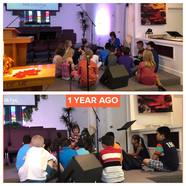|
In a few hours the calendar will flip over to 2019 (I wonder how many times I'll still write 2018) and a whole new year will start. Most of us will have New Year's resolutions, and we'll try to start fresh in a new year. In writing out the message for the first Sunday in January, I put down seven things that I'm praying and longing for in 2019.
1. That we would have an outward focus - Most churches and pastors say they want to reach out to their community, but they don't have a true outward focus. Looking outward is more than inviting people, it's developing a culture and climate where guests are not only valued, loved, appreciated, but expected. And when we have an outward focus, we stop saying things like "that's my seat." 2. That we would live with radical generosity - Generosity is more than our finances, but it's never less. Forbes magazine speculates that charitable giving in 2019 could be up to $13B less with the changes to the tax system from the 2017 Tax Cut legislation. The fear is that fewer people will give because it won't give them the usual tax break. Instead, I pray that we would be more generous with our resources, more generous with our time, more generous with our hospitality, more generous with our serving. 3. That we would worship in unity - The church gathers each week for corporate worship, for singing together, for fellowship, for hearing the Word preached. And behind each of those is a community emphasis. We don't worship in a bubble. We worship with others. We cannot worship divided. Jesus, not Abe Lincoln, was the one who said a house divided cannot stand. When we worship in unity, we're putting our preferences for style/lyrics/etc. aside for the sake of the Body. 4. That we would raise men to lead - We need men and women both to step into roles and responsibilities within the church. But despite our best efforts of wild game dinners, Promise Keeper rallies, and Tim Tebow speaking opportunities, many churches fail to see men engaged in worship, leadership, and responsibility. 5. That our hearts would break for lostness - I think some, not most, church folk would be perfectly happy with lost people who simply "act right." But when we drive through our communities, when we sit in the bleachers at Little League, or we're around a family meal, it begs the question: are we truly broken for lostness? Until we are truly distraught over people's lostness, we'll never truly be driven to share the Good News. 6. That we would make mission a lifestyle, not a program - Spurgeon is credited with saying that "every Christian is a missionary or an impostor." Mission isn't something people do in a hut or a village, it's what we do at work, the gym, the backyard, and wherever God has placed us. When we recognize the community we live in, the job we have, and the friends we've made as the mission field God has given, we'll live in such a way that we share Christ. 7. That we wouldn't be content to exist - If you've ever heard the "Don't Waste Your Life" message from Passion in Memphis, you'll remember the line Piper gave where he told the crowd that most of them didn't care if their lives counted. For far too many of us, we're in the same boat. We're content to exist. We're content to muddle through our routine, show up on Sunday and sing and listen and repeat the next week, and not really ever care that our lives didn't count. I pray we'd never settle for simply existing. Pastors, what are you longing/praying for in 2019?
0 Comments
 It's always nice to take a step back and think about the previous year. We're so often cynical and jaded because everything around us is so negative. So here's what I'm glad for from 2018: 1. My son got baptized - This summer I had the joy to baptize Sam after he gave his life to Jesus at VBS. Everything else this year is a distant second to knowing my little guy will be forever with Jesus.  2. Carrie and I hit 10 years - It's hard to believe October 18, 2008 was 10 years ago! Since then we've moved twice, bought two houses, had two awesome kids, both finished doctorates, and so much more. And we got to celebrate it on a Disney trip without the kids. Totally different experience, and well worth it!  3. We took the Disney plunge - Our family went all in on living in Florida and bought Disney passes. It's really the Happiest Place on Earth, and lives up to the hype every time we go. 4. Our church adopted new guiding documents - I know policy documents are as exciting as paint drying, but this was such a big deal to put policy and protocol in place. My goal has been at Emmanuel to leave her better than I found her. 5. We became a homeschool family - After weighing for years how we could and if we should, we made the commitment to homeschool Sam (and soon Gray) through Classical Conversations. We're so grateful for the dear friends we've made, how Sam is doing with his learning, and the flexibility it gives our family. 6. I joined the Life & Ministry Podcast as a co-host - My friends Dan & Michael invited me to join as a co-host on their weekly podcast. We have fun, we laugh, we talk ministry. Check it out and subscribe on iTunes!  7. Trunk or Treat - Our church got all-in on an awesome chance to reach out into our community. We had fun, our people got behind it with decorating their cars (and themselves) for the night. Hopefully this is something we're able to do next year. 8. Carrie is a rock star - Carrie got the chance to be a part of the writing team for Vacation Bible School for Lifeway. I'm so proud of her and so excited people around the country will be reading her material! What are you grateful for from 2018? Your palms are sweaty, you're tapping your foot, you've made your 4th cup of coffee. And the phone rings. It's a number you've expected. It's a search committee from a church that wants to talk to you. And thanks to the miracles of modern technology, you can video chat easily.
One thing that far too many ministry candidates fail to do is ask good questions of the committee. They've come armed with a list of questions for you about theology, testimony, family, background, experience, vision, strengths/weaknesses, personality, worship style, etc. Failing to have any good questions for them is both a red flag an an invitation to get into a dumpster fire. As much as a committee is interviewing you, you need to interview them. You need to get to know who they are, what their church is like, how their community works, and more. Can I propose 10 questions to ask? 1. How did the position come open? - That's the better way of asking "what happened to the last guy?" You want to know if it was a resignation, termination, retirement, or something else. You need to know why the previous leader left. Talk about the impact that had on the church, and find out if they've had a history of short tenures. If it was a termination, ask how they made it gracious. 2. Does your church reflect your community? - Sometimes churches stick out like sore thumbs in their community because they don't reflect their neighbors. Every situation is different, so you need to ask the questions of the community and the church's demographics. If it's a largely Anglo church in a minority community, ask why. If it's a church of Millennials in the middle of a massive retirement community, ask why. 3. How was the last major conflict handled? - Churches will have areas of conflict, it's inevitable. The issue is how that conflict was handled. Was it swept under the rug, did it lead to a blowup in a business meeting, or was it handled well through lay leadership and humble repentance? Conflict left unresolved by a previous tenure isn't their problem anymore, it could become your problem. 4. Does the church have debt? - I don't believe necessarily that church debt is bad. It's sometimes essential for a church to incur debt for a campus expansion, renovation, or to accommodate growth. But with debt must come a plan to pay it off. One time in an interview I asked about debt and if they had a plan, and the answer was "Oh yes, we have a balloon note and pay the minimum each month and refinance before the balloon pops." It's also important to find out if their debt retirement is affecting their ability to do ministry. 5. What was your church's most recent major victory? - Find out what the church has been able to celebrate in the last year or two. Maybe they had a huge turnout for VBS or a Block Party, or maybe they had a note burning. Find what they've been able to cheer about and rejoice. 6. What is your church actively doing to engage your neighbors? - This is where you find out where/if they have boots on the ground. Sending checks to mission agencies is great. So are sending postcards to families who move in your area. But what are you doing to actively engage your neighbors? 7. What is your church's view on marriage and gender? - Typically the spectrum on gender will range from egalitarian (men & women are equally competent and capable of serving in ministry leadership) to complementarian (men & women are equal but with distinct roles in the church). It's not wise to go to a church outside of your viewpoint. Also, what is the congruence between the church's view on marriage, divorce, sexuality, etc. and yours? 8. How many people has your church baptized in the last few years? - Church growth is great, but not always when it comes by transfers. Healthy church growth happens when people are added through baptism, when they come to faith in Christ and are nurtured in the church. Along with this question, you need to know the demographics of the baptisms. If a church is only baptizing the children of its adult members, something might be off. But if people are being baptized who've been invited as teenagers, young adults, or senior citizens, that's a sign of a church's intentionality to reach its neighbors. 9. How does your church make decisions? - This is always a fun one to ask. Churches have to make decisions, and they have a way of making them, whether it's written or assumed. Find out what has to be voted on by the whole church, who has the ability to make decisions, where does the locus of leadership come from, and what do the staff and lay leadership have as their area of responsibility. Typically decisions in most churches can be decided by: the Pastor, the Staff, the Deacons, some form of Leadership Team/Church Council/Strategic Leadership, or Board. 10. What are the staff dynamics? - A friend of mine took an interview with a search committee which led to a staff lunch. After leaving the lunch he called and said "Dude, they don't like each other. And it's awkwardly obvious." If you're interviewing with a search team for a lead/senior pastoral role, you need to know what kind of staff you're inheriting. Is it a healthy staff? Is it divided? Is it an exhausted staff? What kind of personalities are there? Are they good as a team? If you're talking with a search committee, drop me a line and I'd be glad to chat about navigating the process well and getting a good feel for the church as a potential fit!  Normally when I pick up a book on pastoral care and shepherding/counseling, it starts right into the list of how-tos and what-to-dos. But Dave does it different. Dave starts by calling us as pastors and those who care for the hurting to look at our own souls. The reality is that as Christians, our hearts hurt differently. They don't hurt less, they hurt differently, and hurt more. They hurt more because when we are surrounded by grief we see the ripple effects of pain and loss. And we as leaders bring our own heart pains into the ministry we bear to others. I noticed this sitting in an ICU room last year with a family who was in the horrible position to have to say goodbye to their father. It flashed me back to a similar ICU room holding my mom's cold hand just after Christmas. And while it helped me to empathize with the family, it flooded back my own pain. That's why it matters that we nourish our own souls from the Word, in prayer, in fellowship, and by not only reading the Bible like a study exercise but to meditate on it, soak it in, and let it permeate our hearts. If we are to care for others, we must ensure that our souls are well cared for. I won't give away all from the book, I want to encourage you to pick up a copy of it yourself. But I do want to highlight a few things from it: 1. The ministry of presence is very real - More often than not, the best thing we can do in our care for the hurting is to just be there. We don't have to say anything. We don't have to offer up some pep talk or encouragement. Sometimes we just have to sit there. It's easy for us to talk, it's harder for us to sit. But sometimes sitting is what we must do. Sometimes we must cry, sometimes we must listen to the wails or screams of grief and not reply. 2. If we love, we'll serve - Filed under the list of things I didn't learn in seminary was a few months ago feeding an elderly man in our church breakfast in his hospital room. He couldn't see his food because of his blindness, his mind was slipping, and no one was there. And I loved him. So I served him. If we want to prove that we love those we're around, we'll serve them. We'll serve them like Jesus served His disciples. 3. We'll point people to Hope - One of the worst things we can do with someone grieving or hurting is give them a false hope. Those false hopes can include "Sleep it off and you'll be better in the morning," or "God's going to fix this because you love Him," or any other well-meaning but misplaced phrase. Instead, the Hope we point people to in the midst of their pain is the true Hope, the Risen Christ. Our bodies may never be healed, our broken hearts may never be mended... until Jesus makes all things new again. 4. We pursue the hurting - I believe the two ways we help the hurting are we give a soft place to land and we lovingly pursue. Furman talks about how his wife's church cared for her during her single years after an accident. It reminded me of the dear friends and church I was part of when I went through agonizing loss. The phone calls, the cards, the lunch trips and coffee appointments. Looking back, I saw they never gave up on me. I hope we as pastors and our churches do the same for the hurting in our midst.  "What are you looking at?" "Oh the silent majesty of a new winter's morn, the clean cool chill of the holiday air... Christians posting all over social media that Santa is an anagram of Satan." It's that time of year again folks. Let the war begin. What do Christians do about Santa? No little amount of ink (or digital type) has been spilled giving a myriad of opinion on this. Part of leading our families well will mean we have to navigate the Santa issue at some point. One important consideration - This is something that I categorize as a "freedom of conscience" issue. In other words, people who love Jesus and are committed to Him in their lives can have different opinions on an issue without compromising Christian fellowship. When it comes to Santa, I think we have three options:  1. No Santa - I read a really helpful post from Desiring God that advocates this position. And I'm not opposed to this perspective. The point of Christmas is all about Jesus, and for Piper putting something else as competition to the majesty of Christ is a dilution of the season. In this view, Santa becomes a carrot dangled for morality (he's making his list and checking it twice to find out who's naughty or nice) to get kids to behave so they can get stuff for behaving. Also in this view is a concern that by promoting fiction as truth it will cause breakdowns later or in other areas of a child's life. Many of you reading this are in this camp. My best friend and his family don't do Santa, they do a huge birthday party for Jesus, complete with funfetti cake. It's awesome. I love their conviction.  2. Santa as a Side Note - In this perspective, Santa is a part of the Christmas celebration, but he comes as a secondary emphasis to Baby Jesus. Families who follow this thread will take their kids to see Santa, will leave cookies & milk (we've toyed with leaving coffee but that might be too obvious), but will spend attention and focus on Baby Jesus. They'll sing carols, do Advent, talk often about Baby Jesus, and use the backstory of St. Nicholas in teaching their kids about giving at Christmas. Our family does this perspective: we reduce Santa's giving to one gift, we make sure to remind our kids that Santa loves Jesus and wants Sam & Gray to love Jesus too, but we try to avoid using Santa for behavior correction (although it has slipped before, don't judge). 3. Santa as Centerpiece - Families who do this will make Buddy the Elf look like the Grinch. Everything is about Santa. There's Elf on the Shelf. There's tons of gifts at Christmas from Santa. Jesus is included in the discussion and is focused on in the family celebration, but the majority of the time of year is on the "magic" of Christmas. Families who participate in this perspective will not see a big deal with emphasizing Santa with smaller children. However you and your family choose to celebrate Christmas and incorporate Santa is something to give careful thought to, have discussions with your spouse about, and walk in knowing that people will do it differently than you do. Part of our responsibility with freedom of conscience issues means that we will not unnecessarily judge those in another perspective. The important thing for us all to remember, regardless of what we think about Santa, is that Christmas is all about the Baby King who would be the sacrifice for our sin.
How has your family navigated the Santa issue? Side Note - Our family tries to do these things to keep the emphasis on Jesus, you can use these if you want, or not. It's ok. 1. We make sure to do Advent devotions which include Scripture reading, songs, and prayer time. You can get a number of them for free online. 2. Santa gets credit for one gift, not all of them. For us we want our kids to know that Mom & Dad are the ones who give them the most gifts. It doesn't always work, because my oldest is convinced Santa has an unlimited budget so why can't he get the giant LEGO set. 3. Jesus is the real hero at Christmas. That's what we often come back around to at dinner, during bedtime talks, and whenever the situation presents itself. There's no mistaking who Christmas is really about, and why it's so wonderful to celebrate Jesus' birthday. 4. Our family keeps our church and our involvement as crucial. Our kids are in the Christmas skit, Carrie sings in the musical. We sit together as much as we can in church to sing Christmas hymns. We look forward to Christmas fellowships when we can make it to celebrate with people. 5. We do everything to make it as fun as possible. We do a Christmas flip at our house, just about every room is decorated, we have lights on the house, and we drive around with hot cocoa to look at lights. We sing Joy to the World and Jingle Bells, we all have Christmas PJs, and it's a big deal for each of us to take the boys to do stocking shopping. 6. We trust God with our boys' hearts and minds. Eventually they'll learn that there's a reason Santa and Daddy have similar handwriting. And when that day comes, we'll trust that they'll be old enough to understand that it was in good fun, but that they have a bigger Christmas Hope, Jesus.  Over the weekend, a devastating exposé of abuse and cover up in circles of fundamental, independent Baptist churches was published on the Fort Worth Star Telegram. Sarah Smith writes story after story of victims who were silenced by shame, intimidation, or fear of reprisal from the people they had been taught to respect and obey without question. It's been tragic to not only read the testimonies, but also to see the attempts to silence and discredit the victims as gold diggers, plants, or worst of all agents of Satan. In the aftermath and rubble of this awful reveal, those of us who lead in churches have to know and learn a few things. 1. We can no longer afford to be naive - When we pretend that things like this could never happen to us, we have set ourselves up for a horrific fall. Fundamental Independent Baptist churches have a wide reputation for legalism, shunning, and power. But so do many of our circles. We can't ever assume that abuse, assault, or sexual predation is a "them" problem. 2. We cannot ignore or solve problems ourselves - One of the mistakes that many churches make when they are confronted with allegations of misconduct is they try to handle things internally. I don't question the motive of most churches and pastors with this. There is no seminary class that teaches how to handle these situations. Or some think they can solve the problem themselves by treating it as a church discipline issue. We cannot do that. One story I know was that a victim came forward, was questioned by the pastor, and then was ignored until a second victim surfaced. Pastor, when confronted with an allegation of abuse or potential criminal conduct, call the authorities. 3. We must protect ourselves - The rule is simple guys, if it's not yours, keep your hands off. That goes for money, women, power, etc. You do not play lightly with fire. You do not put yourself in compromising situations. And you, under no circumstance, give a foothold for any kind of impropriety. 4. We can't tolerate abusers - Sadly, in far too many cases of abuse or misconduct, the church takes the side of the accuser and in many instances leaves the victims out to dry. There is a place for pastoral care and love towards the accused, but it never comes at the expense of the victim. If victims of sexual abuse or misconduct do not feel safe in our church, do not feel they are protected and loved, it really doesn't matter what our policy manual says. Those alleged to abuse must be removed from any roles, reported to authorities, and if necessary terminated from employment. 5. We must listen to victims - The reason why many women fail to report what happened to them? They're not believed. Or even heard. Our sisters in Christ are pleading for their pain to be heard, for their voice to be believed. The pain they live with, the scars they bear, are not something to be brushed off as "boys will be boys" or an "innocent mistake." Let's pray for those who have experienced abuse in our churches. Let's pray for those who abused that they would repent, answer to justice, and be part of redemption. But above all, let's never allow this kind of rampant abuse to happen under our watch. You're there right now aren't you? You've awoken from your turkey coma and realized that your pants don't fit as nicely anymore. You've been binge-watching Friends expecting it to go off Netflix so you've comforted yourself with ice cream. You look outside and see snow & ice and decide tomorrow will be a better day to run. The scale shows numbers you've never seen before. When anyone sets out on a diet, they're not aware of the fact that many times they're setting themselves up for failure. How? The goal is too ambitious. I'm not saying ambition is bad, but sometimes we set the bar so high that we can't get over it no matter how hard we try. So after a few weeks without the Biggest Loser results (friendly reminder they have professional nutritionists, personal trainers, and they're on a closed set instead of snacking at work), we get frustrated and give up. Pastors, chances are you've done the same thing when you lay out goals. You want to change the world, you want to double attendance in six months, you want to see a million dollars given for a capital campaign or you want every single person in your community's door knocked on. And after 3 months, you give up. I'm all for dreaming up BHAGs (Big Hairy Audacious Goals), they keep a vision in front of us of what ministry could be like if we were able to reach it. But BHAGs do not a longitudinal ministry make. We should aim high, always. But like Jesus said, we also must count the cost.
 You can keep up with your progress - Slow and steady progress is hard to see week to week, it's hard to see month to month even. But over time it becomes visible. That's why you keep up with your weight loss on a diet. A pound a week becomes 20 after a few months. That's pretty cool! So with your ministry, write down, record, take pictures of what you're trying to accomplish. I had no idea at our church what was happening with our children's ministry until a picture popped up on my social media. It was cool seeing what had happened in a year. Celebrate milestones - One friend of mine when he goes on a diet celebrated every 10 pounds lost with a steak dinner. Sure it pushes the scale up a bit, but hey you hit a milestone! Pastors, celebrate your milestones. You launch a new small group, pray over the leader and make a big deal about it! An outreach event leads to a baptism, cheer it on! An old debt is paid off, burn that note and have a party, er, fellowship! Get buy in from other leaders - It's really hard to go on a diet plan when your spouse isn't. The temptation to eat cookies instead of carrot sticks gets stronger. As ministry leaders, we have to get buy in from others in leadership positions. It'll never work without, as Kotter calls it, a guiding coalition. Those leaders become allies, supporters, encouragers, and champions for the goal. Without them, it's impossible to push through the tough times. How can you get buy in? Sell the vision. You're not trying to fleece them like a mattress salesman, you're getting them on board with what you're trying to do. One pastor I learned a lot from, when I asked how he led his church through a major transition, said "I ate a lot of pie." He took time to talk with key figures and dialogue about the goal. Keep Going - The normal way we see diets is like a yo-yo, we lose the 20 pound goal we set and then we go right back to our bad behaviors and eating like a pig. Momentum carries when we not only reach our goal but we change our attitude & actions. That's culture. Culture is when people aren't satisfied to reach the first goal, they want to keep going. That's the difference between Clemson, Alabama, Georgia, Ohio State and the rest of college football--they're not satisfied easily, they're still chasing. As pastors, we cannot be complacent or rest on the laurels of past accomplishments. Keep going. Keep pushing. Keep making steps forward to reach your community. How have you as a leader been able to keep the momentum going? I get it, it's not fun to talk about money as a pastor. Sometimes it feels like all we do is have our hand out for one thing or another. We see the hucksters on TV talk about their private jet (because you can't stand and worship in coach) and their lavish lifestyle. You're scared to upgrade your beat up car because you don't want people making comments. But pastors, we shouldn't be scared to talk about money. Jesus did. Of the 38 parables recorded in the Gospels, 16 of them deal with money/possessions. Almost 300 verses in the Gospels are connected with money. (HT to Preaching Today) Jesus covers the spectrum, calling for the rich young ruler to sell everything he has, commends the widow for her small offering, declares that camels can squeeze through needles more than money lovers can enter heaven, and reminded us that we are to render to Caesar what is his. Why should we preach/teach/talk about money as pastors? 1. The way we handle money is a mirror to our worship - I've always said the ways to tell what someone's worship and devotion are to look at their calendar and checkbook. If we hang on to our money like a miser and fail to give sacrificially, we've proven what we really worship. We can sing and shout all we want, but the rubber meets the road in our worship when it comes to what we're willing to give as a sacrifice. 2. Giving is theologically rich and pragmatically necessary - First the necessary: you have to pay your bills. Utility companies are a blessing but they like to get paid to keep the lights on. Ministry costs money. The outreach drive? It costs. The church fellowship? It's not free. The staff to lead and equip? They have mortgages. But beyond the pragmatism is a rich theology of giving. God gives incredibly gracious and generous to us in how He provides, and the way we give back is a theological treatise far more than any systematic textbook. 3. Giving leads to a generous spirit - Teaching about giving is a spark towards cultivating a culture of generosity. Generosity is more than money. Generosity means giving our time, opening our homes, pouring into the lives of others, fostering hospitality, deepening fellowship, and more. Generosity comes when we realize what's ours isn't really ours to start with, and for many of us that begins with our finances. 4. A Giving Church is a Healthy Church - I know we've all heard the horror stories about churches that hold pastors and ministries hostage with giving (a handful of people withheld their giving until they get their way), but the overwhelming number of churches are fertile ground for health. There's no magic number for how much a church should have to be a healthy giving church, but if a church is marked by generosity, it'll permeate every layer of the church climate.
|
Scott M. DouglasA blog about leadership and the lasting legacy of family ministry. Archives
August 2023
Categories
All
|
 RSS Feed
RSS Feed



